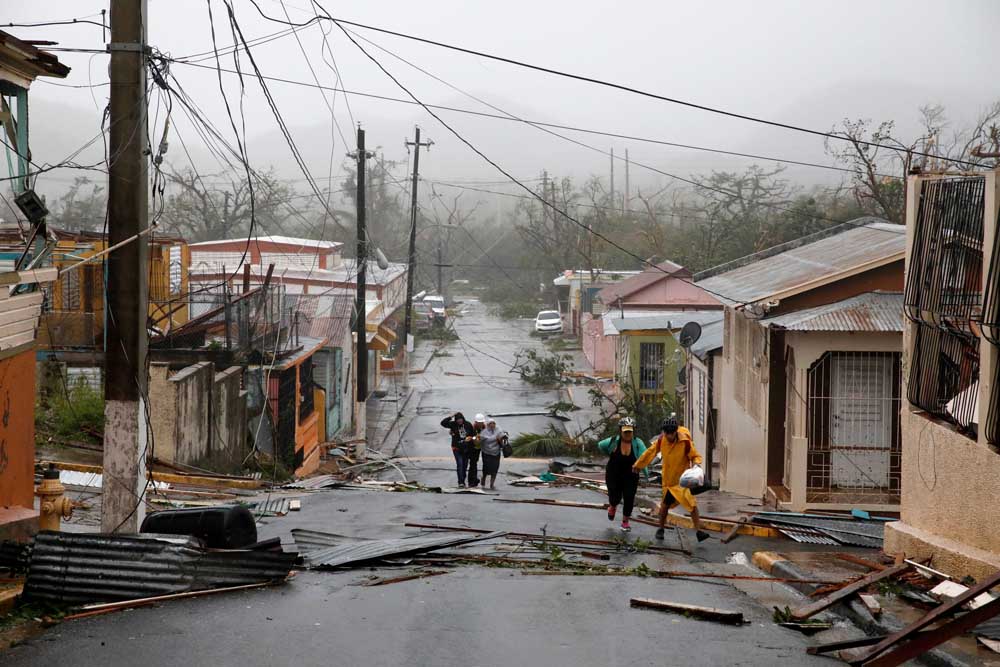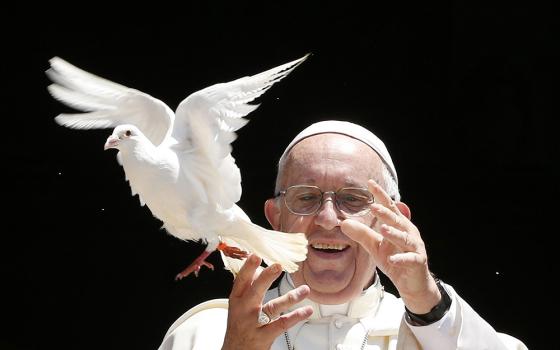
Rescue workers help people Sept. 20 in Guayama, Puerto Rico, after the area was hit by Hurricane Maria. (CNS /Carlos Garcia Rawlins, Reuters)
By now, many are likely familiar with the litany of environmental disasters that accompany climate change, or what some believe is more appropriately described as "climate breakdown."
Great change or disaster, such as the recent hurricanes ravaging the Caribbean and Gulf Coast communities, also presents an opportunity about new paths to rebuilding — at least for those not weighted by the primary needs of securing food, water and electricity, assuring loved ones are safe, and getting back to work, among a million other immediate concerns in such situations.
As the wider community, maybe it is our job to provide this space and support for it.
What may be less known is that organizations like the International Energy Association have determined that to avoid average global temperature rise of 2 degrees Celsius — the primary global warming limit targeted in the Paris Agreement — we cannot continue to build and invest in infrastructure (power plants, cars, etc.) based on fossil fuels. Six years ago, IEA estimated that infrastructure in place by 2017 would already be sufficient to take the world past the 2 degrees mark, a point at which climate scientists predict climate impacts, such as increased flooding, droughts and intensified storms, may become irreversible.
Such fossil fuel-based investments could be especially immoral where we have good alternatives, such as energy infrastructure rebuilding in Puerto Rico now, or future new car purchases.
There is a responsibility to preserve life and generators will help that occur, but at the same time, a large investment in clean infrastructure for the long term needs to begin now.
Hurricane Maria and this month of Mary also bring to mind the Magnificat. The Magnificat emerged as Mary was confronted by extreme change in her circumstances, reflection on which led to the shared moral clarity recounted in the liturgy of the hours, over the centuries since. Things will not and should not go back to the way they were.
Those of us who work in infrastructure, public sector development, impacts of technological disruption and climate action (or all of the above) see change coming. And we are often tempted to think "in some reasonable period of time." In fact, an abrupt shift away from fossil fuels is necessary, desirable and urgent. Life will be much better as soon as we do.
I have seen the temptation in many contexts to go to (and try to guess or project, usually incorrectly) what seems feasible within the existing system, rather than consider what is possible or moral, in a broader context. The Spirit is alive, and more than we thought is possible. And Hurricane Maria reminds us that we must engage that here and now. The Magnificat urges us to think of the kingdom in the present time and ponder its connection to us and our responsibilities:
He has cast down the mighty from their thrones,
and has lifted up the lowly.
He has filled the hungry with good things,
and the rich he has sent away empty.
Might we be on the cusp of a new system of development? Are we responsible, as Christians, for bringing about a new, just system? We are not here to comfort ourselves but to apply our skills to bringing about the kingdom and abundant life for all. We pick up God's charge that things can and must be different. As dangerous, even life-threatening, as the situation may be, we have a God of surprises.
Now is the time for metanoia and the path that will bring good news to all. We cannot rebuild or continue as we were. Hurricane Maria help us focus on how "the time is now."
We must take responsibility, though, for community well-being. In the wake of natural disasters such as Maria, Irma and Harvey, aid should be provided in central locations as long as it's needed, along with meals, water, shelter, electricity and connectivity. Provision of microgrids that can contribute to the grid or operate independently (solar panels plus batteries to store that power for all churches, schools, hospitals and community centers) would also be appropriate.
Already there are signs of hope that such a rebuild isn't just a dream but can become reality. Elon Musk, co-founder of Tesla, is talking with the governor of Puerto Rico about how the island may rebuild its power grid with solar power and battery storage.
I would be happy to talk. Hopefully, Tesla can be helpful.
— Elon Musk (@elonmusk) October 6, 2017
We are interconnected and we take responsibility as Catholics for our brothers and sisters to live. The federal government also has a primary role in ensuring the life, safety and the well-being of its citizens, including the 3.4 million Puerto Ricans, all of whom are American citizens. Rebuilding can and will be the responsibility of the U.S., as it was during past hurricanes, such as the devastating storms that hit the island territory in the midst of the Great Depression.
So what are the specifics needed toward rebuilding on that island today?
In addition to microgrids, Puerto Rican communities need time, space and support to imagine how things should be, now and in the future, as they rebuild. Could each Catholic parish in Puerto Rico be matched with multiple parishes in the U.S. to partner in responding to the needs and opportunities at hand? We have models in our Catholic tradition — cooperatives and more — oriented to care of the common good and our common home.
Pope Francis reminds us in his encyclical "Laudato Si', on Care for Our Common Home" that we should "not delay" in our transition to a fossil-free world.
Advertisement
After the recent series of hurricanes, and especially in Puerto Rico, it is probably a good time to discuss or rediscover the basics of what people need, as well as what we can share, and the individual assets and gifts we bring to the table.
Matched parishes would not only have a chance to give and support, but to be an extended family, sharing love and responsibility. It would present a chance to journey together on a path where we learn from each other.
We hear the Word: The Almighty has done great things and lifts up the lowly.
Now is the time to live out and bring about the change we need.
[Marie Venner is a researcher, leader in the infrastructure sector and former public servant. She can be reached at marie@rapidshift.net or marie@catholicnetwork.us.]





